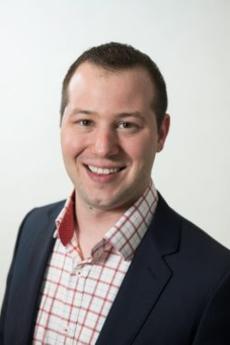
Managing life as a student can be difficult. If you add being a husband, father and business owner on top of the demands of being a student, it wouldn’t be surprising if one found that overwhelming. Not Josiah Allen, though. As a class of 2022 student at the University of Minnesota College of Pharmacy, Allen is thriving with this exact scenario.
Allen and his wife are from Rochester, Minnesota, and have two boys ages five and three respectively. He founded Medigenics Consulting in 2017 and has remained the principal consultant of the company throughout his time as a student. Allen and his team primarily work with commercial laboratories involved in or interested in pharmacogenomics and advise them on product development, medical education strategy, key opinion leader relationship development, and market trends.
After earning a bachelor’s degree in psychology from Wheaton College in Wheaton, Illinois, Allen got a job working in the department of psychiatry and psychology at the Mayo Clinic in Rochester. He was assigned to a project involving psychiatric pharmacogenomics (the study of genetic predictors of psychiatric medication response), and this ignited his interest in pharmacy.
“As a psychology major and the son of a psychiatric nurse practitioner, I was aware of the challenges that many people can have with finding psychiatric medications that are both effective and tolerable,” Allen said. “ I quickly saw the promise of pharmacogenomics as a tool that could help us do a better job of selecting medications for people with psychiatric illnesses, thereby improving their quality of life and reducing the number of suicides and other tragic outcomes of these conditions. As a result, I dove in and fell in love with the field.”
Allen worked in psychiatric pharmacogenomics for close to ten years. During that time, he realized he needed to get an advanced degree to further his skill set and knowledge, particularly in pharmacology. Pharmacy seemed like a great fit for him, so with proximity to family and the University of Minnesota’s reputation for training clinically-oriented pharmacists in mind, Allen made the decision to attend the University of Minnesota’s College of Pharmacy.
“And ultimately, let’s be honest - when you have the number two pharmacy program in the U.S. right in your backyard, it’s hard to pass that up,” Allen said.
The school has allowed Allen to make the most of his time here by letting him work around the many other demands on his life. The college’s flexibility has provided Allen with the opportunity to thrive. One way the college has helped Allen is by amending their excused absence policy to include missing school for unavoidable childcare conflicts.
Allen says his time at the College of Pharmacy has been a great experience. “The faculty and staff have been stellar and I’m continually impressed by the ability and initiative of my fellow classmates. As an older student with a family and a career, I was a bit apprehensive about balancing my roles as a husband, father, business owner, and student. It certainly hasn’t been easy but I’ve found the college to be responsive to concerns and challenges that are unique to student parents.”
Throughout his time at the college, Allen has been a part of the University of Minnesota Pharmacogenomics Grand Challenge Initiative. The initiative is a University of Minnesota-funded project to implement pharmacogenomics on a statewide scale. He also completed a Melendy research project that involves the development of a pharmacogenomic knowledge assessment to aid clinicians in educating patients about pharmacogenomic testing.
Currently, Allen and a couple other students are working on an initiative to update the Minnesota Board of Pharmacy rules to increase students’ access to internship opportunities outside of traditional compounding/dispensing roles. On top of these endeavors, Allen is involved in multiple national pharmacogenomic groups including the Clinical Pharmacogenetics Implementation Consortium (CPIC) and the Pharmacogenomics Access and Reimbursement Coalition (PARC). Allen also has an internship with the Fairview Pharmacy Services medication therapy management group.
Throughout his many experiences, Allen has learned many things that he intends to use going forward in his career. One area where he has learned a lot is the relationship between academia, industry, and clinical practice in health care.
“One thing I’ve learned throughout my career, including in consulting, is that innovation often begins in academia but needs commercial enterprise to drive that innovation into mainstream clinical care,” Allen said. “There’s sometimes a tendency for these two groups to be at odds: academia sometimes views industry as ‘the dark side’ that’s just out to make a buck, while industry can sometimes view academia as an ivory tower, out of touch with what’s happening in the real world. Both of these are distortions, albeit ones that contain a nugget of truth. The reality is that those three pillars of health care – academia, industry, and clinical practice – all need each other. They each play a complementary role in improving health for our patients. Commercialization without academically rigorous science is often snake oil, science without a mechanism for translation is just trivia, and clinical practice without either of the other two is stagnant. We need to continue to develop public-private partnerships that can quickly and cost-effectively translate new science into lifesaving interventions in the clinic. That's something that I hope will remain a big part of my career in the future.”